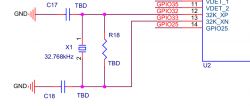Hi. Have any of you guys used the RTC on ESP chips? I've recently played around a bit with writing code in micropython for this chip and from my observations it appears that it is very inaccurate the clock can speed up by tens of seconds in 10 minutes of operation. If you have any experience with RTC on these chips then please let me know your findings. I also take into account that I wrote something wrong in the code.






